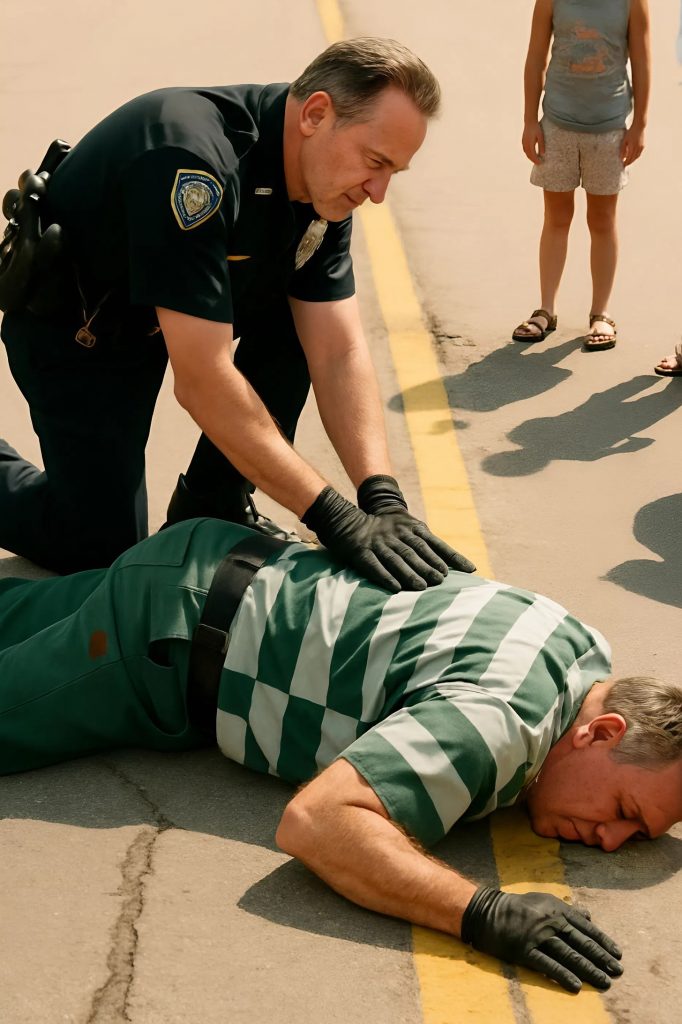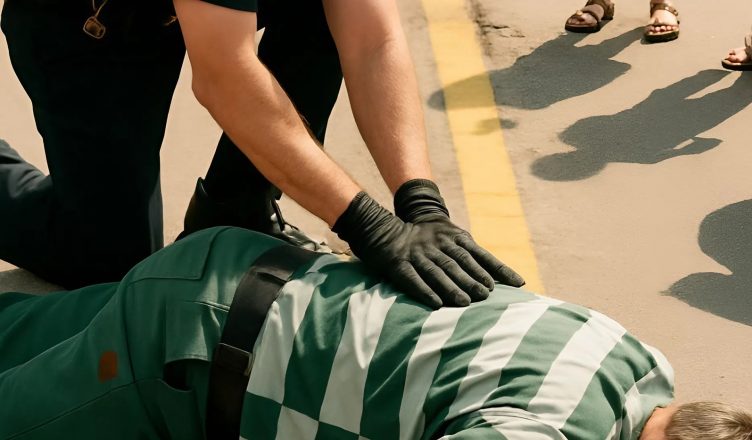The sun that day was merciless — thirty-six degrees in the shade, the kind of heat that makes everything hum. The asphalt shone like glass; it was too hot to touch. And yet there he was — my husband Harold, seventy-two, face down on the road. Handcuffed. His arthritic knees pressed into the tar as if into a brand. Four squad cars ringed his bicycle like predators around prey.
What was his crime? A noisy exhaust. That was all.
It didn’t matter that the bike had passed inspection two weeks earlier. It didn’t matter that Harold served two tours in Vietnam, earned a Bronze Star, and had never been anything but a careful man whose only slips were the occasional speeding ticket. None of that mattered to the man whose boot kept pressing his shoulder whenever Harold tried to shift to ease the pain.
Officer Kowalski — young, confident, the kind of officer who carries authority like armor — stood over him and barked orders. “Stay down, you big mutt!” he shouted, loud enough for passing smartphones and the children in idling cars to hear.
I watched a woman in a minivan whisper to her kids: “See that man? That’s what happens to people who break the rules.” She didn’t know what she was looking at. No one did. They saw a scene, not a person. They certainly didn’t know who I was.

When they finally let Harold get up, his face was streaked with heat, his hands trembled — not with anger, but with humiliation. I crouched beside him and asked quietly, “What did he say to you before he let you go?”
Harold fixed his gaze on some distant point and whispered in a voice raw with shock: “He told me people like me should keep off the road. Said it was time to ‘hang up the pipe before someone dies.’”
The words were a cold blade. Spoken by a man who had never read Harold’s letters, never seen his medals, never heard the laughter that lived in the corners of his mouth. To them he was a rule to be enforced, a body to be controlled. To me he was everything I have loved for half a century.
Anger flared, quick and fierce, but I did not give it the form of fists. I am not a woman of sudden violence. I am a woman who knows how to make a moment last, to turn a single humiliation into a chain of evidence. I knew what to do.
First I recorded. I filmed the scene, the squad car numbers, the license plates. I asked witnesses — the woman in the minivan, a boy with a soccer ball, a young mother pushing a stroller — to tell me what they had seen. I called the veterans’ office and told them who lay at my feet. I filed a complaint with the police department — not out of blind faith in the system, but to make an official trace of what had been done.
When I attached photographs of Harold’s reddened skin, a shaky video clip with his whisper barely audible, and the written statements, something in me lifted. It would not erase the burn or the sting of that afternoon. It would not restore the dignity that had been flattened into tar. But it would make sure the moment could not be wiped away like a footprint in heat.
I contacted the local paper. I told the story not for sensation, but because people deserve to know: behind every “rule-breaker” there can be a lifetime of service, sorrow, and hidden scars. Behind a tremor in a hand can be a veteran’s memories of things no one should have to remember alone.
When I sat back at home and began to write my complaint letters and emails, Harold squeezed my hand and gave, for the first time that evening, a true smile. “I never imagined you’d be this mad at them,” he said.
“I’m not mad,” I answered. “I just won’t let them rewrite your life with a single order.”
I will not pretend I know how this will end. Justice is not a hammer you swing once; it is a slow work of evidence, witnesses, and voices raised in sequence until the truth can no longer be ignored. But I do know this: if anyone believed they could humiliate my husband in public, on scorching asphalt, without consequence — they were wrong. We will make this story heard. We will insist that those in uniform remember the people they are sworn to protect.
Because when small men with big badges forget humanity, someone has to remind them that service begins with respect.
